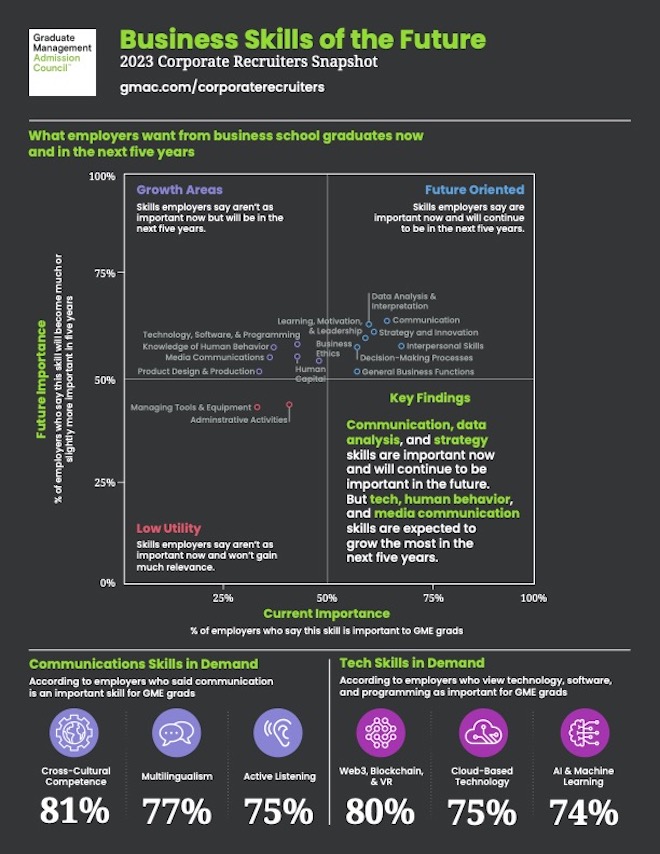
Employers are reaching out to signal a desire for those with AI skills
In October, the Graduate Business Roundtable published a survey showing that 74% of business schools have integrated generative artificial intelligence into their curricula. But earlier this year came the reason why: The Graduate Management Admission Council found as part of its big annual survey of employers that 74% are looking for tech skills in new hires — and that they specifically want them to be proficient in AI and machine learning.
GMAC’s annual Corporate Recruiters Survey comports exactly with the later finding by GBC Roundtable, formerly known as MBA Roundtable, a global association of B-schools whose mission is to advance graduate business education through curricular and co-curricular innovation. It also fits with the conclusions of a CarringtonCrisp report in March that showed that prospective MBA applicants around the globe want to lean in to capitalize on the perplexing wonders and plethora of unknowns presented by the newly popular technology.
And GMAC’s survey lines up with what B-schools — and Poets&Quants reporting — has been indicating for years: AI is the big thing in B-schools right now, and for the foreseeable future.
OTHER TECH SKILLS IN DEMAND, TOO
In GBC Roundtable’s October survey, 68 B-schools, primarily located in the United States, were represented by 72 faculty and professionals who responded to questions about generative AI and the B-school curriculum. Just as three of four employers told GMAC that they want to hire those with AI skills, GBC Roundtable found that three of four (74%) report their B-school already teaches generative AI as subject matter in the curriculum today. For now, however, generative AI usage in the business school is limited: Only 15% say that it is significantly or fully taught as subject matter within the B-school curriculum, while one in five (19%) report dedicated courses for generative AI subject matter.
GMAC’s Corporate Recruiters Survey came from over 1,000 surveys conducted between January and March 2023, with 34 nationalities represented. The full report was released in June. It focuses on future workplace skills employers see as growing in demand, and how global trends impact hiring decisions. Over half of the sample of employers came from Fortune 500 companies.
Those looking to hire tech-focused grads made clear to GMAC that AI and machine learning are vital competencies to have. But proficiency in generative AI — that is, AI capable of generating text, images, and other media — is not the only technical or technological skill employers are seeking, GMAC found: Surpassing even the demand for AI, 80% of companies are seeking candidates with expertise in Web3, blockchain, and virtual reality skills; three-quarters of these companies emphasize the importance of skill in operating cloud-based technology.
MULTILINGUALISM, ACTIVE LISTENING & CROSS-CULTURAL COMPETENCIES PRIZED
Surveyed employers also highlighted communication, data analysis, and strategy expertise as the most essential skills for graduates — and they expect to find these skills even more essential as time passes and global connectivity grows. Multilingualism, active listening, and cross-cultural competence were also valued skills for surveyed employers, particularly those in the tech and consulting industries, as they look ahead to the next five years.
Regionally, employers in Western Europe and the Middle East had specific concerns regarding cross-cultural competence and nonverbal communication skills; employers in the United States, by contrast, were more critical of graduates’ essential communication skills: active listening, negotiating, and conflict resolution. U.S. employers “also expressed lower confidence with how equipped graduates were in technology, software, and programming skills,” GMAC writes, “which 62% of the sample overall found to become even more important over the next five years.”
“We are witnessing a significant transformation in the hiring landscape, with a clear shift towards the prioritization of cutting-edge technologies in recruitment,” says Nalisha Patel, Europe regional director at GMAC, in a November 15 news release highlighting the findings of the survey. “As technology continues to shape the future workplace, it not only changes how we work, what skills we need to be successful, but also it impacts with who we work with too.”
Read GMAC’s Corporate Recruiters Survey here.
DON’T MISS IT’S HERE: HOW B-SCHOOLS HAVE ‘STEADILY & CAUTIOUSLY’ INTEGRATED AI INTO THEIR CURRICULA and AI CERTIFICATES & SPECIALIZATIONS FOR MBAs








